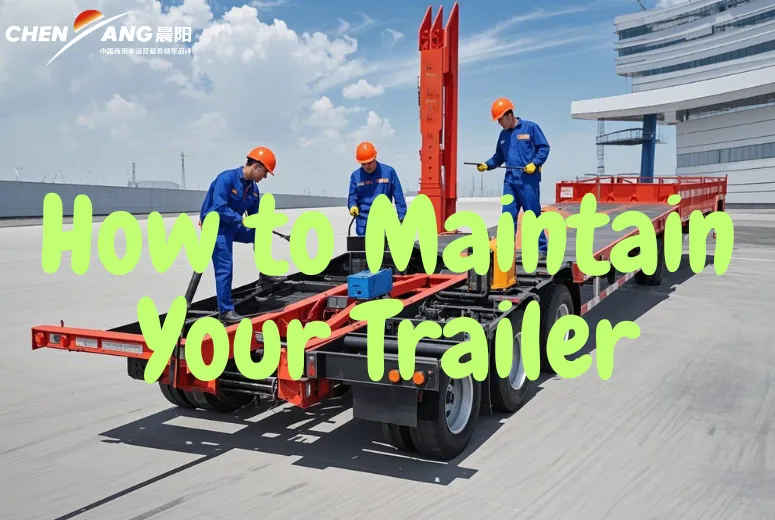How to Maintain Your Trailer: Preventive Care and Repairs
Trailers are indispensable tools for transporting goods, equipment, or recreational vehicles, and keeping them in top condition ensures safety, performance, and longevity. Regular maintenance and timely repairs are essential to avoid costly breakdowns and extend your trailer’s service life. Whether for occasional use or heavy-duty applications, proactive care can save you time and money while keeping your trailer roadworthy.

Inspecting the Trailer Structure
The foundation of flatbed trailer maintenance begins with a thorough inspection of its structural components. Over time, wear and environmental factors can cause damage to the frame, axle, and welds. Look for signs of rust, cracks, or dents in the metalwork, as these can weaken the trailer’s integrity. Cleaning the structure regularly and applying protective coatings, such as anti-rust sprays or paint, can prevent corrosion and preserve the frame.
Check the flooring for signs of warping, rot, or damage, especially if the car hauler trailer is exposed to moisture. Wooden floors should be treated with sealants, while metal floors may require anti-slip coatings. Ensuring the structural components are in good condition provides a strong foundation for the trailer’s overall performance.
Maintaining the Tires and Wheels About Trailer
Tires are one of the most critical aspects of trailer safety and performance. Regularly inspecting tire pressure, tread depth, and overall condition can prevent blowouts or uneven wear. Tires should be inflated to the manufacturer’s recommended pressure, which ensures even load distribution and reduces stress on the trailer.
Wheel bearings also require attention, as they support the trailer's movement. Greasing the bearings at regular intervals minimizes friction and prevents overheating, especially during long hauls. Additionally, check the lug nuts for tightness and replace damaged or corroded wheels promptly to avoid accidents.
Checking Lights and Electrical Systems of Trailer
A trailer’s lighting and electrical systems are vital for visibility and communication on the road. Conduct regular checks to ensure all lights, including brake lights, turn signals, and marker lights, are functional. Burned-out bulbs should be replaced immediately to maintain road safety and comply with legal requirements.
Inspect the wiring harness for frayed or exposed wires that could cause shorts or interruptions. Protective coverings and proper routing of cables can shield the wiring from wear and environmental damage. If your trailer is equipped with electric brakes, test the brake controller periodically to ensure proper synchronization with the towing vehicle.
Keeping the Hitch and Coupler in Top Shape About Trailer
The hitch and coupler are the connection points between the trailer and the towing vehicle, and their condition directly impacts towing safety. Regularly clean and lubricate the coupler to ensure smooth operation and a secure connection. Inspect the safety chains for wear or rust, and replace them if they show signs of weakening.
The hitch ball should also be free of corrosion and properly sized for the trailer’s coupler. Over time, hitch components may loosen or become misaligned, so check their attachment points and tighten any bolts or fasteners as needed.
Brakes and Suspension Maintenance of Trailer
Trailers equipped with braking systems require regular maintenance to ensure optimal stopping power. Inspect brake pads, drums, and rotors for wear, and replace them before they become excessively worn. Test the brake controller settings to ensure it delivers consistent and reliable braking force.
The suspension system absorbs shocks and maintains stability during towing. Check for worn-out leaf springs, shocks, or bushings, as these can affect the trailer’s handling and load capacity. Replacing damaged suspension components promptly prevents further strain on the trailer and towing vehicle.
Cleaning and Storing Your Trailer
Proper cleaning and storage practices protect your trailer from unnecessary wear and environmental damage. After use, remove dirt, debris, and grease from the trailer’s surfaces. Pay special attention to the undercarriage, where mud and road salt can accumulate and cause corrosion.
When storing the trailer, choose a dry, covered area to protect it from weather exposure. If indoor storage is not available, use a weather-resistant cover to shield it from rain, snow, and UV rays. Disconnecting the battery and keeping tires off the ground with blocks or jacks can also extend the trailer’s lifespan during long-term storage.
Addressing Repairs Proactively About Trailer
Even with diligent maintenance, trailers can develop issues that require repairs. Addressing these problems early prevents them from escalating into costly or dangerous failures. Common repairs include replacing damaged lights, patching leaks, or welding structural cracks.
When repairing your trailer, always use high-quality parts and materials to ensure durability. For complex repairs, such as axle alignment or brake system overhauls, consulting a professional mechanic is recommended. A proactive approach to repairs keeps your trailer in top condition and minimizes downtime.
-
Low Maintenance + High Availability of Ownership for Mining Dump TruckNewsJul.17,2025
-
Drum Drive Axle + Air Suspension for Electric Tractor TruckNewsJul.17,2025
-
33m Boom + Full Hydraulic Outriggers: Narrow-Site Construction Practices of Mixer Pump TruckNewsJul.17,2025
-
18L Large Drum + Extended Drain Interval of Gear Oil for Heavy Duty TrucksNewsJul.17,2025
-
13m Cargo Space + Polyurethane Insulation: Long-Term Cold Chain Protection Solutions for Refrigerated Semi-Trailers for SaleNewsJul.17,2025
-
10T Water Tank + 2.5MPa Fire Pump Efficiency Analysis of Water Tank Fire TruckNewsJul.17,2025
Popular products

























